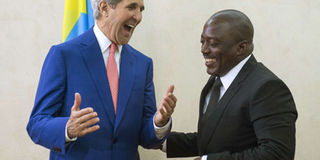Breaking News: CDF Ogolla involved in KDF chopper crash
Kabila silent on plans for third term

The President of the Democratic Republic of Congo (DRC) Joseph Kabila (right) meets with US Secretary of State John Kerry in Kinshasa on May 4, 2014. Will President Joseph Kabila seek a third term in office come 2016? That is the big question taxing the minds of political pundits in DR Congo. AFP PHOTO
What you need to know:
- During the House’s opening ceremony, usually reserved for budgetary issues, the President of the Senate, Mr Leon Kengo wa Dondo, appealed to the Congolese not to allow any constitutional change.
- Last Saturday, several people took to the streets of the capital Kinshasa, protesting against a presumed intention of President Kabila to amend the constitution to allow him seek a third term in office.
- Among the protesters were top political figures including former National Assembly Speaker and current leader of the Union for the Congolese Nation (UNC) Vital Kamerhe, and Secretary-General of the Union for Democracy and Social progress (UDPS) Bruno Mavungu.
KINSHASA, Tuesday
Will President Joseph Kabila seek a third term in office come 2016?
That is the big question taxing the minds of political pundits in DR Congo.
Equally troubling is whether the President (pictured) will seek a constitutional amendment to facilitate his continued stay in power.
President Kabila has maintained a studious silence on his tenure amidst political debates and even open street protests.
To him, it was too early to debate the next election’s agenda. “Don’t let people be distracted with such a debate. We have plenty of time to debate on the presidential election scheduled to take place in December 2016. At the moment, we have to address development problems which are crucial,” President Kabila says when confronted with the issue.
Last Saturday, several people took to the streets of the capital Kinshasa, protesting against a presumed intention of President Kabila to amend the constitution to allow him seek a third term in office.
Among the protesters were top political figures including former National Assembly Speaker and current leader of the Union for the Congolese Nation (UNC) Vital Kamerhe, and Secretary-General of the Union for Democracy and Social progress (UDPS) Bruno Mavungu.
Majority of the demonstrators were students from various local universities and high schools.
The Kabila tenure issue has also occasioned divisions among Congolese legislators.
MODIFICATION OF THE CONSTITUTION
During the House’s opening ceremony, usually reserved for budgetary issues, the President of the Senate, Mr Leon Kengo wa Dondo, appealed to the Congolese not to allow any constitutional change.
“The modification of the Constitution is likely to provoke insecurity and unrest in this country where the political situation remains so fragile and volatile,” said the Senate President.
To Mr Kengo wa Dondo, a third term for President Kabila could provoke an outrage, leading to new rebellions or wars.
The Speaker of the National Assembly, however, said the House had not received any Bill relating to a possible constitutional amendment.
“The issue is not on the agenda. I personally think that the current debate about a possible modification of the constitution is the manifestation of the normal practice of the democracy,” he added.
Thought the Opposition insists that there was no need to amend the constitution, the president’s party enjoys a parliamentary majority, making it easy to amend the constitution after a referendum.
The targeted article is No. 220, which states that the DRC president is elected for a five-year term, renewable only once.




